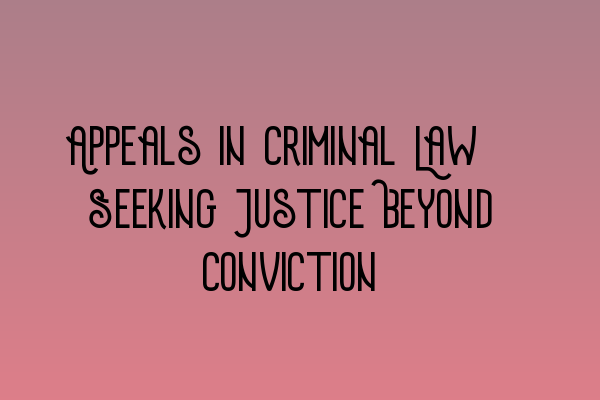Appeals in Criminal Law: Seeking Justice Beyond Conviction
When individuals find themselves convicted of a crime, it can be an overwhelming and distressing experience. However, it is important to understand that the legal system provides options for seeking justice beyond conviction through the process of appeals.
Appeals in criminal law allow the convicted party to challenge both the conviction itself and the resulting sentence. It provides an avenue for examining whether there were errors or unfairness in the initial trial, ensuring that individuals are not wrongfully punished for crimes they did not commit.
The Grounds for Appeal
There are various grounds on which an appeal can be made in criminal law, including:
- Errors in law: Appeals can be based on mistakes made by the judge or errors in the interpretation or application of the law.
- New evidence: If new evidence becomes available after the trial that could significantly impact the outcome, an appeal can be filed.
- Unfair procedures: If the proceedings were conducted in a manner that was unfair or prejudiced the accused, an appeal can be made.
- Ineffective assistance of counsel: If the defense lawyer provided inadequate representation that affected the outcome of the trial, an appeal can be pursued.
It is crucial to seek the expertise of a qualified criminal defense solicitor who can assess the case and determine the most applicable grounds for appeal. They will provide guidance and representation throughout the entire process, ensuring that every opportunity for justice is explored.
The Appeals Process
The appeals process typically involves several stages, including:
- Filing the appeal: A notice of appeal must be filed with the appropriate court within the specified time limits.
- Reviewing the case: The appellate court will review the trial record, including the evidence, transcripts, and legal arguments.
- Oral arguments: The appellant’s solicitor and the prosecution will present their arguments before the appellate court judges.
- Decision: The appellate court will then make a decision based on the grounds of appeal and the evidence presented.
If the appeal is successful, the conviction may be overturned or a new trial may be ordered. If the appeal is unsuccessful, individuals may have further options to explore, such as appeals to higher courts or even to the Supreme Court.
SQE Criminal Law & Practice
For aspiring solicitors specializing in criminal law, the SQE Criminal Law & Practice exam is a crucial step towards qualifying as a solicitor in the UK. It is important for candidates to be well-prepared for this exam to enhance their chances of success.
At SQE Criminal Law & Practice Law UK, we offer comprehensive preparation courses for both SQE 1 and SQE 2 exams. Our SQE 1 Preparation Courses and SQE 2 Preparation Courses provide candidates with the necessary knowledge and skills to excel in their exams.
In addition, we understand the importance of practicing exam-style questions to build confidence and familiarity with the format. Our SQE 1 Practice Exam Questions and SQE 1 Practice Mocks FLK1 FLK2 resources are designed to help candidates assess their knowledge and identify areas for improvement.
It is vital for candidates to stay up-to-date with the SRA SQE Exam Dates and plan their study schedule accordingly to ensure they are well-prepared for the exams.
Seeking justice beyond conviction is a fundamental right, and appeals in criminal law provide a pathway to rectify any errors or unfairness in the legal process. With the right legal representation and thorough preparation, individuals can pursue justice and protect their rights.
